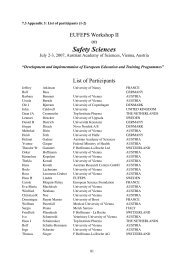2011 Anniversary Yearbook - EUFEPS today and history
2011 Anniversary Yearbook - EUFEPS today and history
2011 Anniversary Yearbook - EUFEPS today and history
You also want an ePaper? Increase the reach of your titles
YUMPU automatically turns print PDFs into web optimized ePapers that Google loves.
<strong>EUFEPS</strong> Newsletter, 2004, vol. 13, issue 3<br />
Pharmaceutical Research<br />
Community Contributions<br />
<strong>and</strong> Expectations in New<br />
European Union Countries<br />
Aleš Mrhar<br />
Faculty of Pharmacy, University of Ljubljana, Ljubljana, Slovenia<br />
The 10 new European Union countries,<br />
i.e. Czech Republic, Cyprus, Estonia,<br />
Hungary, Latvia, Lithuania, Malta,<br />
Pol<strong>and</strong>, Slovak Republic <strong>and</strong> Slovenia,<br />
have to solve the problem of the lag<br />
in technological development of their<br />
industries, when compared to the<br />
15 countries of the former EU. The<br />
promotion of new technologies in<br />
production processes is a necessary<br />
condition for restructuring of their<br />
economies. This promotion, to be<br />
successful, must be accompanied by<br />
a modern educational <strong>and</strong> training<br />
system providing professionals for<br />
running research <strong>and</strong> development in<br />
academia on one side <strong>and</strong>, on the other,<br />
by the capability of industry to include<br />
educated <strong>and</strong> trained people into their<br />
environment.<br />
<strong>EUFEPS</strong> has been recognized as<br />
a powerful platform to promote<br />
pharmaceutical sciences across united<br />
Europe by integrating academic, industrial<br />
<strong>and</strong> regulatory institutions to reach safe<br />
<strong>and</strong> effective medicines faster. However,<br />
the majority of these mechanisms have<br />
been successfully established within 15<br />
countries of the former EU but not between<br />
them <strong>and</strong> new EU countries. For this<br />
reason, <strong>EUFEPS</strong> must develop activities<br />
to bridge this gap as soon as possible.<br />
Although Slovenia may not be a<br />
typical case when looking at the stage<br />
of development of pharmaceutical<br />
profession <strong>and</strong> sciences, because these<br />
are rapidly growing fields in this country,<br />
a survey of its institutions can illustrate<br />
successfully the state of affairs in the new<br />
EU countries:<br />
- Slovenian pharmacies have developed<br />
to a high level of professional work<br />
in terms of dispensing <strong>and</strong> distributing the<br />
drugs <strong>and</strong> providing the information on<br />
proper use of drugs. The network is partly<br />
privatized, partly state owned, with the<br />
staff having mainly academic education<br />
<strong>and</strong> trained continuously on national <strong>and</strong><br />
international courses. Modern concepts<br />
such as pharmaceutical care, patient<br />
counselling for prescriptions <strong>and</strong> OTC<br />
drugs are in place. A high st<strong>and</strong>ard of<br />
review has developed in this area with the<br />
Slovenian Chamber of Pharmacy as a nongovernmental<br />
institution, authorized with<br />
the regulation of the quality of professional<br />
service.<br />
• Slovenian pharmaceutical companies<br />
(Lek, Krka) grow progressively <strong>and</strong><br />
are able to compete with the<br />
international companies (Lek recently<br />
became a new member of S<strong>and</strong>oz<br />
group), predominantly in the value-<br />
added generic segment. The two<br />
companies are similar according to a<br />
number of parameters:<br />
employees, approximately 2500<br />
each, one third with academic<br />
education including a substantial<br />
number of Masters <strong>and</strong> Doctoral<br />
Degrees<br />
turnover per year, approximately<br />
500 million euros each, more than<br />
two thirds exported, in considerable<br />
part to EU, USA <strong>and</strong> Japanese<br />
markets<br />
allotment of more than 10% of total<br />
earnings for research <strong>and</strong><br />
development activities.<br />
• Slovenian academic educational<br />
<strong>and</strong> research institutions (one faculty<br />
of pharmacy, two medical faculties,<br />
two faculties of chemistry, two<br />
main research institutes with divisions<br />
involved with pharmaceutical sciences)<br />
are internationally recognized as part<br />
of an advanced system, able to develop<br />
XXXIX<br />
Aleš Mrhar<br />
<strong>and</strong> transfer up-to-date knowledge<br />
<strong>and</strong> advanced technologies in many<br />
directions, both as generator <strong>and</strong> user,<br />
• Slovenian Agency for Medicinal<br />
Products serves as the licensing<br />
authority for drugs <strong>and</strong> medical<br />
devices, playing its part in the<br />
international harmonization process.<br />
In its structures, a large number of the<br />
experts from national pharmaceutical<br />
<strong>and</strong> medical academic circles are<br />
included.<br />
The high level of pharmaceutical<br />
profession <strong>and</strong> science in Slovenia<br />
represents the basis for strong integration<br />
of all institutions in international arenas,<br />
in terms of organizing international<br />
symposia, summer schools <strong>and</strong> workshops,<br />
exchanging professors <strong>and</strong> scientists,<br />
exchanging Ph.D. students, collaborating<br />
with Slovene scientists who are affiliated<br />
to foreign universities <strong>and</strong> companies, etc.<br />
Without doubt, this statement holds good<br />
for any of the 10 countries that joined EU<br />
on 1st May 2004.<br />
The main problem the pharmaceutical<br />
professionals <strong>and</strong> scientists are facing<br />
is that a majority of the 10 countries are<br />
small <strong>and</strong> for this reason, viewed from<br />
a global perspective, they are not freely<br />
appreciated as places with considerable<br />
potential in the fields of pharmaceutical<br />
sciences <strong>and</strong> technologies. Consequently,<br />
the results of their work, that are significant<br />
in many fields, are not met with a wide<br />
response, <strong>and</strong> the transfer of know-how is<br />
still difficult.<br />
What these countries need at the<br />
moment is a settled access to institutions<br />
(faculties, institutes, companies) where<br />
first class educational <strong>and</strong> scientific<br />
programmes are available to bring well<br />
trained scientists <strong>and</strong> well educated




